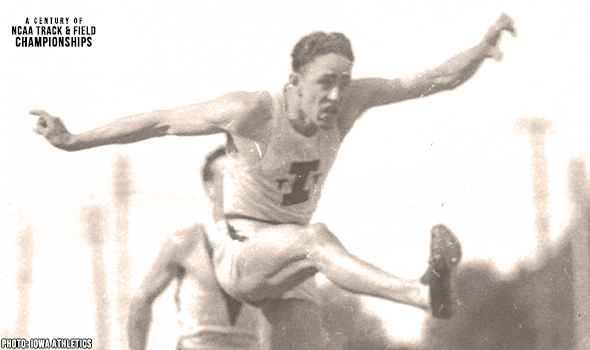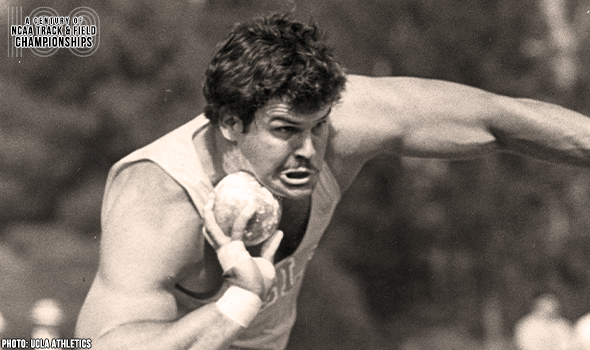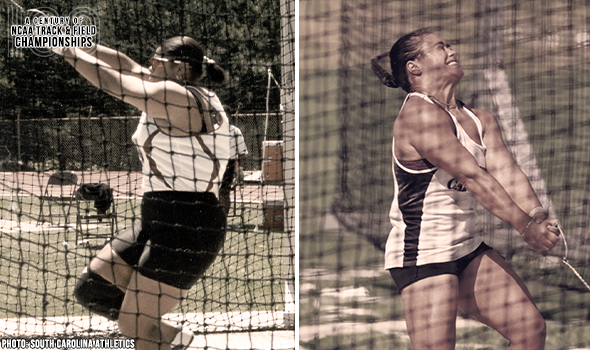
Brookins Hurdled To All-Time Marks
Charles Brookins of Iowa was one of the big stars in the 1923 NCAA Championships, the meet’s third edition held at Amos Alonzo Stagg Field in Chicago.
Brookins ran the world’s two fastest times in the 220-yard low hurdles as he was one of four athletes in the meet to repeat a victory from 1922, when as a sophomore he edged Notre Dame’s Gus Desch in a world record 24.2. Desch, who won the first NCAA 220 hurdles in 1921, had also earned Olympic bronze in the 1920 400-meter hurdles.
That neither of Brookins’ marks from the 1923 NCAA Championships – 23.9 in the heats, 23.6 in the final – was ratified as a world record shows just how much has changed in the sport in nearly 100 years.
It wasn’t just the event, but how it was contested – using the curve for the first portion of the race. The IAAF only ratified straightaway 200/220s (hurdles or sprint) until 1958, and that nearly coincided with when the 220 hurdles was being phased out of the NCAA meet (It was last held in 1959).
Brookins had in fact set ratified world records in the straightaway version – just two weeks earlier at the Big Ten (then known as the Western Conference) Championships he ran 23.2, a mark that would not be surpassed as a world record until 1935, when Jesse Owens ran 22.6 in his Day of Days, also at the Big Ten meet.
Brookins, a native of Des Moines, Iowa, who grew up about 30 miles away in Oskaloosa, won a third-straight Big Ten title in 1924, a year in which there was no NCAA meet so as not to conflict with the Olympic Trials.
He now needed a new event, though, as the 220 lows had long since been replaced on the Olympic schedule by the 400-meter hurdles – not just a longer distance but with hurdles at 36” inches instead of 30”.
Iowa suddenly became a haven for long hurdlers. Iowa coach George Bresnahan – a USTFCCCA Hall of Famer – set up a 400-meter hurdles race a couple weeks before the Trials, but the winner was Hawkeye teammate Chan Coulter, a quarter-miler who shocked in this event at 53.2 when the ratified world record was 54.0. F. Morgan Taylor from nearby Grinnell College was runner-up ahead of Brookins.
Those three made the U.S. team at the Olympic Trials, Brookins also bettering the world record in the heats and semis before losing in the final to Taylor at 52.6, with Brookins (an estimated 52.8) and Coulter following.
A month later at the Paris Olympics, Taylor earned gold while Brookins finished second but was not awarded any medal as he was disqualified for running out of his lane. Taylor’s time of 52.6 was not acceptable as a world record because he had knocked over a hurdle – a rule no longer in force.
Brookins retired from track after winning the 220 hurdles at the 1925 AAU nationals, but Taylor won the 1925 NCAA 220 hurdles and earned two more Olympic 400-meter hurdle berths, including 1932 when he was U.S. flag bearer for the opening ceremony.
The NCAA and collegiate track & field will mark a momentous milestone in the spring of 2021 -- the 100th anniversary of the NCAA Championships and with that, the NCAA Track & Field Championships. In June 1921, the University of Chicago hosted the first track & field championships in NCAA history.
This point can’t be emphasized enough: Not only was the event the first for NCAA track & field, but the first championships for any sport under the sponsorship of the NCAA.
To celebrate, over each of the next 365 days, the U.S. Track & Field and Cross Country Coaches Association (USTFCCCA) will celebrate moments, student-athletes, and coaches that have made a century’s worth of championships special. From humble beginnings to important historical milestones to the modern-day, collegiate track & field has evolved with the American society.
The 2021 edition of the NCAA Division I Outdoor Track & Field Championships begin with preliminary round action on May 27-29 in Jacksonville, Fla., and College Station, Texas. The championships final site and culmination of the celebration is slated for June 9-12, 2021 at the newly rebuilt Hayward Field in Eugene, Ore.

Carr Displayed His World Record Speed
Henry Carr set a meet record in the 220 yards of 20.5 at the 1963 NCAA Outdoor Track & Field Championships.

Joaquim Cruz’d To Meet Record, 800-1500 Double
Joaquim Cruz won three career titles at the NCAA DI Outdoor T&F Championships. In 1983, he set a meet record in the 800 of 1:44.91 & completed the 800-1500 double in 1984.

Back-To-Back 200-Meter Crowns For Annelus
Anglerne “Angie” Annelus won back-to-back 200m titles at the NCAA DI Outdoor T&F Championships in 2018 & 2019. Her 22.16 winner from 2019 is the 4th fastest mark in collegiate history.

Indoors? Outdoors? Johnson Starred In The PV
Jan Johnson won the pole vault title at the 1970 NCAA Division I Outdoor T&F Championships and tied the meet record of 17-7.

Beard Capped Sensational Year At NCAAs
Jessica Beard won the 400 & then split the fastest 4×400 leg ever recorded at the NCAA DI Outdoor T&F Championships to lead Texas A&M to a relay crown.

Biles Brothers Boast Historic Winning Feat
Martin Biles & Robert Biles were the first siblings to win the same event at the NCAA DI Outdoor T&F Championships. Marty won the javelin in 1940 & 1941, while Robert did so in 1942.

Branta Set NCAA MRs In 1500, 3000
Cathy Branta set meet records in back-to-back years at the NCAA DI Outdoor T&F Championships: 8:59.57 in the 3000 (1984); 4:12.64 in the 1500 (1985) as part of a 1500-3K double.

Brophy Led “Deca Central” With MR In 1992
Brian Brophy led a 1-2 finish by Tennessee athletes in the decathlon at the 1992 NCAA Division I Outdoor T&F Championships. He won with a meet record of 8276 points.

UCLA’s Brenner Won Amazing SP Duel In 1984
John Brenner completed the discus-shot put double at the 1984 NCAA Division I Outdoor T&F Championships and won the shot put after an incredible duel against Michael Carter.

Ellerbe, Misipeka Dominated The Hammer
Dawn Ellerbe and Lisa Misipeka went 1-2 in each of the first two years that the women’s hammer was contested at the NCAA DI Outdoor Track & Field Championships.

